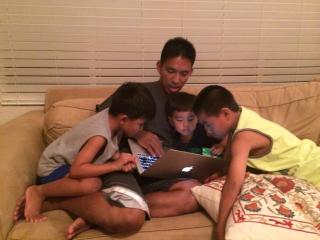You'll be glad you did.
photo by Mary Lewis
❖
You'll be glad you did.

Surround your child with text of all kinds and he/she will learn to read. Read to them, read in front of them, help them, don't push them. Children allowed to learn on their own timetable do learn to read at widely divergent times—there is NO right time for all children. Some learn to read at three years old and others at 12 or even older. It doesn't matter. Children who are not yet reading are STILL learning—support their learning in their own way. Pushing children to try to learn to read before they are developmentally ready is probably a major cause of long-term antipathy toward reading, at best, and reading disabilities, at worst.

Fix them a little tray of cheese and crackers and take it to them, wherever they are, unasked. Sit down on the floor and play with them. If nothing else, just go and give each of them a little hug and a kiss and say, "I was just thinking about how much I love you."
Okay—so that is one good, positive interaction.
Again—just change the next interaction you have with the kids. Focus on making the next interaction another one that builds up your relationship.

LOTS of parents create stimulating environments and give lots of support for their kids' interests; this is not unique to unschoolers. What makes it unschooling is that unschoolers give up the rest of the schooling and trust that their kids will learn what they need to learn by being immersed in the rich and stimulating environment and with parental support of kids' interests.



What do I regret? EVERY minute that I spent worrying over whether the house was clean. That would be my biggest regret. THAT was wasted worry. And there were bad times between myself and the kids over it. I'd get angry that they weren't helping enough. I wish I'd learned earlier about how to enjoy taking care of household stuff and let it go when it didn't get done.Sandra Dodd:
The other day a 15 year old girl wrote on her facebook that she was miserably doing dishes because that was her chore this week. I am going to talk to her about dishes. Because I have learned to LOVE doing the dishes. I don't DO them without enjoying it. I either enjoy it or don't do it. Appreciate or enjoy or at least feel pleasant - I don't have to be deliriously happy . So - sometimes they don't get done. But usually they do. And nobody in my house ever has bad feelings about dishes anymore.
So if I were a hostile critic of your airy-fairy lifestyle, and said "What does this have to do with unschooling," what's the quick kind of answer others here might use when it happens to them?Pam Sorooshian:
If we believe kids are born with an innate urge to learn, that they don't need to be forced to learn, then, logically, that should not apply to just reading, 'riting, and 'rithmetic, but also to all other aspects of life.
Turns out, the more that unschoolers have expanded their understanding of how children learn, the more we've discovered that, indeed, they DO learn best without coercion.

I was just reading a news article and someone was quoted as saying: "Your kids don’t need a 40-year-old friend. They need a parent."
What a tragic dichotomy that one little line sets up!
Every single time that line has ever entered my head, it was leading me in the wrong direction. Every time.
 |

LOTS of parents create stimulating environments and give lots of support for their kids' interests; this is not unique to unschoolers. What makes it unschooling is that unschoolers give up the rest of the schooling and trust that their kids will learn what they need to learn by being immersed in the rich and stimulating environment and with parental support of kids' interests.


